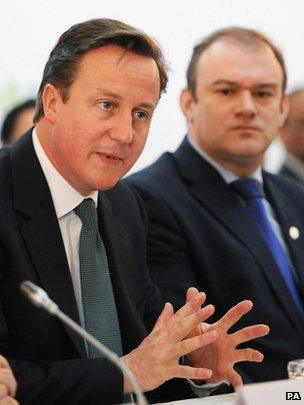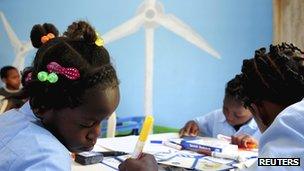Green energy 'cheap within years', says 'passionate' PM
- Published

Mr Cameron (with Energy Secretary Ed Davey) said he was "passionate" about UK renewables
Renewables can be one of the cheapest forms of energy within years, Prime Minister David Cameron has said.
But they need to become economically self-sustaining, truly global, and must receive continued research support.
Mr Cameron was speaking at the Clean Energy Ministerial (CEM) meeting in London, which also saw a number of initiatives aimed at increasing access to clean energy around the world.
He said he was sticking to his vow to lead the "greenest government ever".
A recent opinion poll showed that only 2% of Britons believed the government deserved that title.
The coalition has come under attack on a number of issues, including planning reform, air pollution, badger culling and the "bonfire" of the green quangos.
But Mr Cameron insisted that the UK was now "one of the best places in the world" for green investment and green jobs, with the City of London "number one" for investors in low-carbon energy.
"Solar costs have halved in two years, the price of onshore wind power has come down as well," he said.
"As the costs come down, it's right that consumers pay less for it... I believe that more mature renewable technologies can be among our cheapest energy sources in years, not in decades."
'Lack of depth'
Although the UK remains legally bound to national and European targets on energy and climate change, including that 15% of energy should come from renewables by 2020, recent Treasury-led moves to stimulate gas-fired electricity generation have cast doubt on the depth of the government's commitment to meeting them.
Chancellor George Osborne faced criticism for announcing £3bn of new tax breaks for offshore fossil fuel extraction in his March Budget.
Speaking to ministers from 23 countries at the CEM meeting, Mr Cameron said he was "passionate" about the importance of UK renewables; but environment groups criticised a lack of depth and detail in what had been trailed as a keynote speech.
"We were led to expect a major policy intervention on the environment from the Prime Minister this week, only for his speech to be suddenly downgraded; what we got today was a damp squib," said David Nussbaum, chief executive of WWF-UK,

The UN is working towards energy for all by 2030, with a growth in the "clean" component
"Ministers in countries like Germany and Denmark... are talking in terms of hundreds of thousands of new jobs in the renewable energy sector, whereas the PM today was only talking about a few hundred."
Mr Cameron announced a new initiative provisionally called Norstec, which brings together more than 20 firms based in different countries.
The aim is to create a "second energy revolution" in the North Sea, based on offshore wind and possibly carbon capture and storage.
Referring in part to the recent confusion over feed-in tariffs for solar power, Renewable Energy Association chief executive Gaynor Hartnell joined other trade bodies in calling for greater certainty.
"Stable policies build investor confidence and make projects more bankable," she said.
"The ball is in the government's court to make that happen."
Earlier, the meeting heard International Energy Agency deputy director Richard Jones warn ministers that without urgent action to curb greenhouse gas emissions, the globe was on track to see 6C of warming, rather than the 1.5-2C figure that governments have declared the maximum they want.
Global greening
The CEM meeting also saw the launch of a number of initiatives in support of UN Secretary-General Ban Ki-moon's goals on energy.

Cooking smoke is estimated to shorten the lives of 1.3-1.5 million people a year
Mr Ban wants to see universal access to modern forms of energy, a doubling of the rate of improvement in energy efficiency, and a doubling of the global share of renewables - all by 2030.
This is likely to receive endorsement from world leaders at the forthcoming Rio+20 summit.
Among the initiatives announced at CEM are a global competition for energy efficient products, a project to bring modern lighting to two million people in India, and a global database recording the energy efficiency of various products.
Kandeh Yumkella, director-general of the UN Industrial Development Organization (Unido), said that access to modern energy in Africa was basically an economic and health development tool.
"In my village, women cook with firewood, and we know from the World Health Organization that the impact of that is 1.3-1.5 million deaths each year - more than malaria," he said.
"The dream of every developing country is to be modernised, to live as people live in the UK, for example - they can't do it without energy, but as 60-70% of greenhouse gas emissions come from energy-related activities, we need a transformation."
Follow Richard <link> <caption>on Twitter</caption> <url href="http://twitter.com/#!/BBCRBlack" platform="highweb"/> </link>
- Published26 April 2012
- Published25 April 2012
- Published23 April 2012
- Published19 March 2012